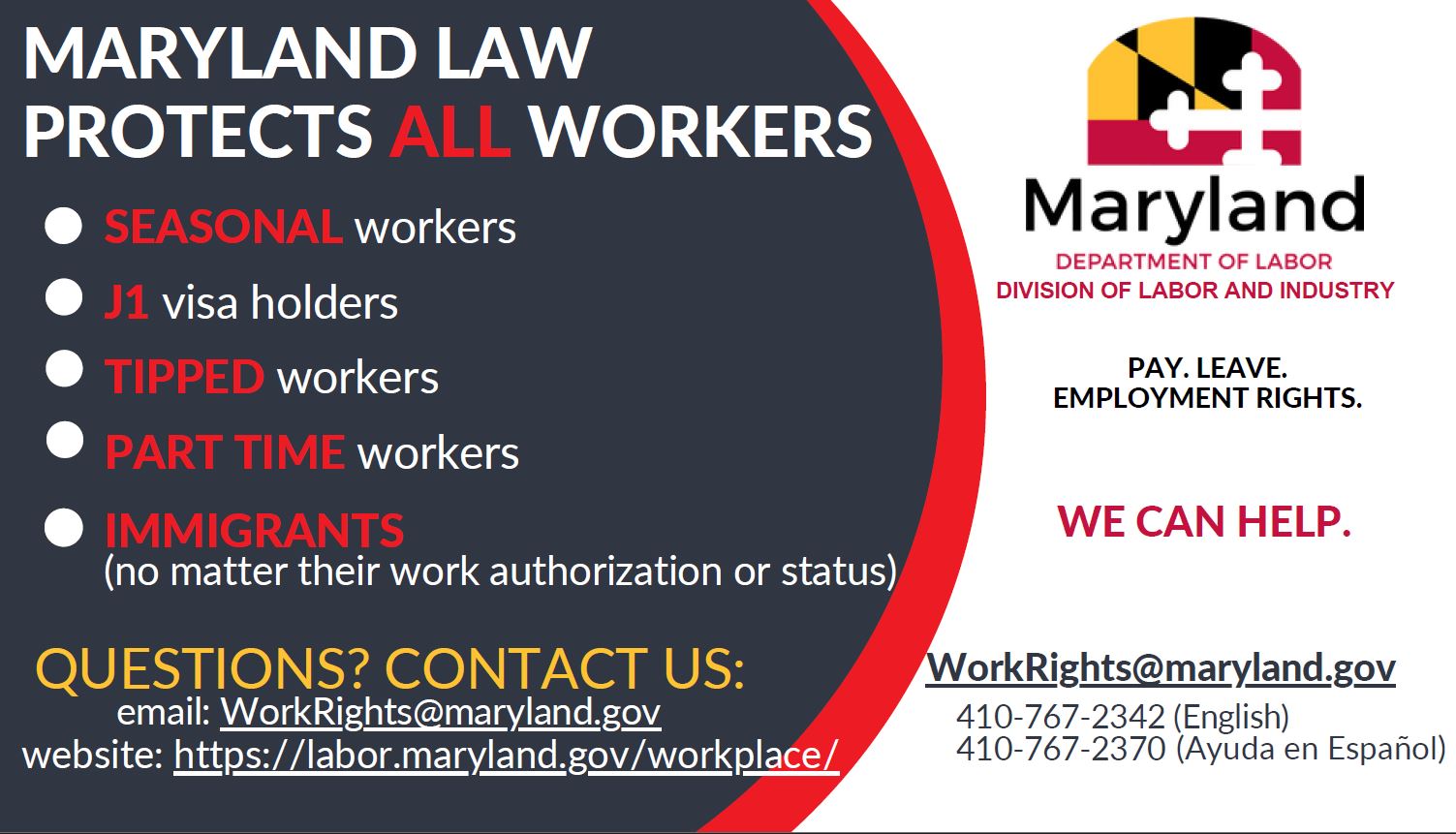What is a “Wage?”
- A wage is payment or compensation earned by an employee for work performed under an employer’s direction, or with the employer’s knowledge or consent.
Minimum Wage under Maryland Law:
- $15.00/hour
- Tipped Employees (earning more than $30 per month in tips) earn $3.63/hour. This amount plus tips must equal at least the State Minimum Wage Rate.
Frequency of Pay:
Employees in Maryland must be paid at least once every two weeks or twice per month.Wage Payment at Termination: When Final Pay Is Due
Each employer shall pay an employee, or authorized representative of an employee, all wages due for work that the employee performed before the termination of employment, on or before the day on which the employee would have been paid the wages if the employment had not terminated (the next scheduled payday.)Wages Paid On Time:
An employer must set regular paydays, and pay all earned wages of an employee on time whether the employee has turned in a time sheet or punch card, quit without notice, or provided any other form or document required by the employer.Compensable Time: For What Time Must an Employee Be Paid?
All of the time an employer requires an employee to be at work is compensable time, whether or not the employee is officially “on the clock.”Tipped Employees: Payment of Less than Minimum Wage
Tipped Employees (earning more than $30 per month in tips) must earn the State Minimum Wage Rate per hour. Employers must pay at least $3.63 per hour. This amount plus tips must equal at least the State Minimum Wage Rate. Subject to the adoption of related regulations, restaurant employers who utilize a tip credit are required to provide employees with a written or electronic wage statement for each pay period showing the employee’s effective hourly rate of pay including employer paid cash wages plus tips for tip credit hours worked for each workweek of the pay period.Holding Wages: “One Pay in the Hole”
An employer may not keep any part of the wage of an employee, either by withholding an entire paycheck, part of a paycheck, or by way of incremental wage deductions from several paychecks, as security against some future or contingent occurrence. This practice amounts to a confiscation of pay and is a direct violation of the law requiring timely payment of earned wages. (Note: This section concerns the indefinite holding of wages as security, not the short-term delay of pay for payroll processing.)Bounced Paychecks:
Paying wages with a bad check is the same as failing to pay wages and may subject an employer to civil and criminal penalties under the Wage Payment and Collection Law and the Maryland Criminal Code.Pay for Lunch and Other Breaks:
There is no law requiring an employer to provide breaks, including lunch breaks, for workers over 18 years of age. An employer who chooses to provide a break, however, does not have to pay wages for lunch periods or other breaks more than 20 minutes where the employee is free to leave the worksite (or workstation), in fact takes their lunch or break (whether freely choosing to leave or remain at the worksite), and the employee does not actually perform work during this period. If employees are told their pay will be reduced each day by one-half hour for lunch, and they are not free to take this lunch period, they must be paid for the time.Overtime:
Overtime is payment to an employee of one and one-half (1.5) times the regular hourly wage for work performed in excess of 40 hours in a 7-day work week. However, under state and federal law, some employers are exempt from the requirement to pay overtime.Assistance:
Division of Labor and Industry
Department of Labor

